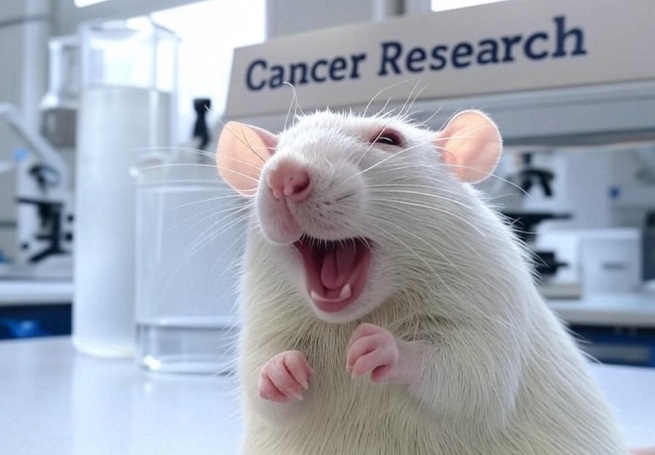Breaking! Past Cancer Studies Using Rodents Are Flawed Because It Has Now Been Found That Human PD-1 Functions Differently!
Nikhil Prasad Fact checked by:Thailand Medical News Team Jan 05, 2025 3 months, 1 week, 1 day, 4 hours, 58 minutes ago
Medical News: In a groundbreaking study, scientists have uncovered critical differences in how the immune checkpoint protein PD-1 functions in humans compared to rodents. These findings challenge decades of cancer research conducted using rodent models, potentially reshaping the way future therapies are developed.
 Past Cancer Studies Using Rodents Are Flawed Because It Has Now Been Found That Human
Past Cancer Studies Using Rodents Are Flawed Because It Has Now Been Found That Human
PD-1 Functions Differently
The study, conducted by researchers at the University of California San Diego (UCSD) and the Chinese Academy of Sciences, revealed that PD-1 - a key protein involved in regulating immune responses - functions far more effectively in humans than in rodents. This discrepancy raises questions about the reliability of rodent models for studying cancer treatments.
PD-1: A Pillar of Modern Cancer Therapy
Discovered in the 1990s, programmed cell death protein 1 (PD-1) plays a critical role in the immune system. Acting as an off switch, PD-1 prevents immune cells from attacking the body’s own tissues. This mechanism has become a focal point for cancer therapies, leading to the development of immune checkpoint inhibitors - drugs that block PD-1 to unleash the immune system against tumors.
These drugs have revolutionized oncology and earned the 2018 Nobel Prize in Physiology or Medicine. However, despite their success, they are effective in only a minority of patients. For years, researchers have relied heavily on rodent models to study PD-1 and its role in cancer. But as this
Medical News report will explain, new findings suggest that these models may not be as reliable as once thought.
The Discovery: Rodent PD-1 Differs Vastly from Human PD-1
A team of scientists at UCSD’s School of Biological Sciences and School of Medicine, led by Assistant Project Scientist Takeya Masubuchi and Associate Professor Enfu Hui, conducted a detailed analysis of PD-1. Their study employed biochemical assays, evolutionary tracing, and animal modeling to compare PD-1 function across species. The results were striking.
The researchers found that the rodent version of PD-1 is significantly weaker than its human counterpart. This weakness stems from the absence of a specific amino acid sequence, or motif, that is present in humans and most other mammals. The motif, crucial for PD-1’s interaction with its ligands, enhances the protein’s ability to regulate immune responses.
“Our work uncovers unexpected species-specific features of PD-1 with implications for developing better preclinical models for PD-1,” Hui explained. “We found a motif in PD-1 that’s present in most mammals, including humans, but is surprisingly missing in rodents, making rodent PD-1 uniquely weaker.”
Implications for Cancer Research
The findings highlight a major limitation in using rodents as models for human immune responses. To further investigate this, the
team “humanized” PD-1 in mice by replacing the rodent version with the human one. This alteration revealed that human PD-1 disrupts the tumor-fighting capabilities of mouse immune cells.
“This study shows that as science progresses, we need a rigorous understanding of the model systems we use to develop medicines and drugs,” said co-senior author Professor Jack Bui from UCSD’s Department of Pathology. “If rodents are outliers in terms of PD-1 activity, we may need better systems to model human disease.”
Evolutionary Insights into PD-1 Differences
The researchers also traced the evolutionary history of PD-1, uncovering intriguing insights. Collaborating with Professor Zhengting Zou and his team at the Chinese Academy of Sciences, they found that PD-1’s unique weakness in rodents likely emerged around 66 million years ago, following the Cretaceous-Paleogene mass extinction event. This evolutionary divergence may have been an adaptive response to rodent-specific pathogens.
“The rodent ancestors survived the extinction event, but their immune receptor activities might have been altered due to environmental challenges,” Hui noted. This evolutionary context explains why rodents - unlike humans - exhibit weakened PD-1 functionality.
Key Findings from the Study
-Weaker PD-1 in Rodents: The study demonstrated that rodent PD-1 lacks a critical amino acid motif, reducing its ability to regulate immune responses effectively.
-Humanization of PD-1 in Mice: When human PD-1 was introduced into mice, their T cells showed reduced tumor-fighting capabilities, underscoring the functional differences between species.
-Evolutionary Divergence: Analysis suggests that rodents lost key PD-1 functionality as an evolutionary adaptation millions of years ago.
-Impact on Cancer Research: The findings question the reliability of rodent models in studying PD-1-based cancer therapies, urging researchers to explore alternative models.
Conclusions
This study challenges the long-standing assumption that rodents are reliable models for human immune responses, particularly concerning PD-1. By uncovering critical functional differences between rodent and human PD-1, the researchers have highlighted a pressing need to rethink preclinical cancer research.
The implications are profound. Cancer therapies that show promise in rodent models may not translate effectively to human patients, potentially delaying the development of life-saving treatments. Future research must prioritize models that more accurately reflect human biology to improve the success rate of PD-1-based therapies.
This discovery also underscores the importance of understanding the evolutionary history of key proteins. By examining the evolutionary adaptations of PD-1, scientists can gain valuable insights into its function and develop more targeted interventions.
The study’s findings were published in the peer-reviewed journal: Science Immunology.
https://www.science.org/doi/10.1126/sciimmunol.ads6295
For the latest Cancer News, keep on logging to Thailand
Medical News.
Read Also:
https://www.thailandmedical.news/news/brigham-study-finds-that-more-than-50-percent-of-cancer-drugs-granted-accelerated-approval-by-u-s--fda-do-not-work-and-sometime-kills
https://www.thailandmedical.news/news/pharma-news-swedish-researchers-warn-that-many-cancer-drugs-are-being-approved-despite-lack-of-proper-efficacy
